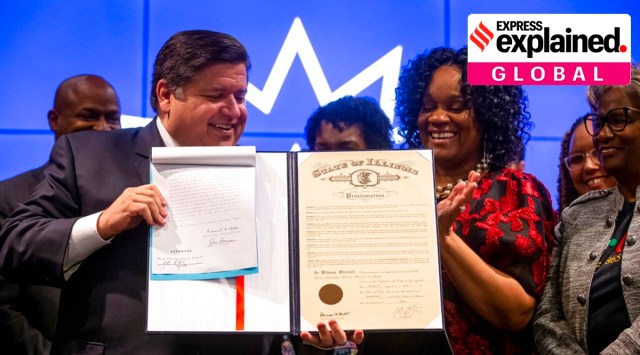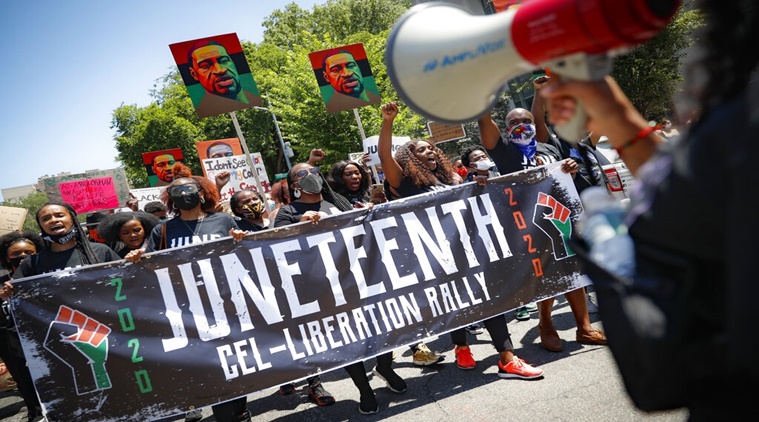Explained: What is Juneteenth, the new federal holiday the US is set to get?
In the state of Texas, the first Juneteenth celebration started from 1866. The day has evolved over the years, with people and communities developing their own traditions and customs.
 Illinois Gov. JB Pritzker and Illinois State Sen. Kimberly Lightford, D-Maywood, hold up the bill marking Juneteenth an official state holiday in Illinois during a bill signing at the Abraham Lincoln Presidential Library in Springfield, Ill., Wednesday, June 16, 2021. (AP Photo)
Illinois Gov. JB Pritzker and Illinois State Sen. Kimberly Lightford, D-Maywood, hold up the bill marking Juneteenth an official state holiday in Illinois during a bill signing at the Abraham Lincoln Presidential Library in Springfield, Ill., Wednesday, June 16, 2021. (AP Photo)US President Joe Biden is soon expected to sign a law making June 19, or “Juneteenth”, a national holiday recognised by the federal government, commemorating the end of slavery after the American Civil War (1861-65).
A bill to establish Juneteenth National Independence Day received bipartisan support in both houses of the US Congress this week, and now needs to be approved by the White House to become law. The legislation comes a year after the killing of George Floyd triggered anti-racism protests across the country, bringing about a national reckoning on systemic racism.
Juneteenth will be the first new federal holiday created in almost four decades, and will now enjoy the same status as the 10 existing annual holidays, which include Memorial Day, Veterans Day and Thanksgiving. The last such holiday – Martin Luther King Jr. Day – was created in 1983, in honour of the civil rights hero.
On June 19, 1865, two months after the Civil War had ended, Major General Gordon Granger, from the victorious Union side, arrived in Galveston, Texas, and issued an order to free the last enslaved people on US soil.
Newsletter | Click to get the day’s best explainers in your inbox
What is Juneteenth?
Juneteenth– the portmanteau of June and nineteenth– is the oldest nationally celebrated commemoration of the ending of slavery in the US, observed on June 19 every year. At present, it is recognised as a holiday in 47 US states and the District of Columbia. It is also known as Emancipation Day or Juneteenth Independence Day.
Last year, legislation to make Juneteenth a federal holiday was blocked in the then-Republican controlled Senate after Ron Johnson, an ardent Trump supporter, opposed the measure, saying an additional federal holiday would mean taxpayers footing a bill worth millions of dollars due to paid leaves for federal government employees. This time around, the bill has been passed unanimously by the powerful 100-member chamber.
 In this June 19, 2020, file photo, protesters chant as they march after a Juneteenth rally at the Brooklyn Museum, in the Brooklyn borough of New York. (AP Photo)
In this June 19, 2020, file photo, protesters chant as they march after a Juneteenth rally at the Brooklyn Museum, in the Brooklyn borough of New York. (AP Photo)
On January 1, 1863, then-president Abraham Lincoln issued the Emancipation Proclamation, which declared that “all persons held as slaves” within the states in rebellion “are, and henceforward shall be free.”
Even so, more than two years after Lincoln’s proclamation, many slave owners continued to hold their slaves captive by hiding this information from them and keeping them for one more harvest season, as per the Congressional Research Service (CRS).
So what then, is the significance of Juneteenth?
On June 19, 1865, Major General Gordon Granger arrived in Galveston and announced the end of both the Civil War and slavery. Since then, Juneteenth has become a largely symbolic date representing freedom for African Americans.
As per CRS, Granger’s announcement read the following, “The people of Texas are informed that, in accordance with a proclamation from the Executive of the United States, all slaves are free. This involves an absolute equality of personal rights and rights of property, between former masters and slaves and the connection heretofore existing between them, becomes that between employer and hired labor. The Freedmen are advised to remain at their present homes and work for wages. They are informed that they will not be allowed to collect at military posts; and they will not be supported in idleness either there or elsewhere.”
In the state of Texas, the first Juneteenth celebration started from 1866, with community-centric events such as parades, cookouts, prayer gatherings, historical and cultural readings and musical performances. The day has evolved over the years, with people and communities developing their own traditions and customs. For instance, some communities purchased land for celebrating the day, such as Emancipation Park in Houston, Texas. Juneteenth was recognised as an official holiday in Texas on January 1, 1980.
As per the National Juneteenth Observance Foundation (NJOF), the era of the “Modern Juneteenth Movement” began in 1994 when a group of Juneteenth leaders from across the country gathered in New Orleans, Louisiana, to work towards the greater recognition of Juneteenth.
- 01
- 02
- 03
- 04
- 05







































